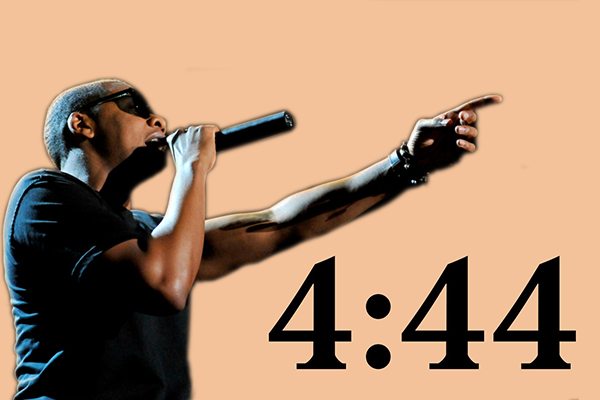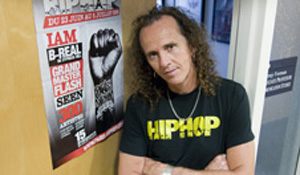What Jay-Z’s new album says about his life, hip-hop


Four years after the debut of “Magna Carta…Holy Grail,” Jay-Z has released his 13th studio album, “4:44.” The album has been met with critical acclaim and touches upon social and cultural issues, including age, relationships, and gentrification.
For more perspective on Jay-Z’s latest release—available on iTunes and through Jay-Z’s music-subscription service Tidal—and the current state of the hip-hop landscape, we spoke to media and screen studies professor Murray Forman, who’s been studying hip-hop culture for more than 20 years.
What are your thoughts about the album, particularly of Jay-Z critiquing the younger generation of hip-hop through some of his lyrics?
Jay-Z is an interesting character in all kinds of ways. He’s been in the rap game for 20 years. We’ve really had the opportunity to see him come of age. I would say his most important transition in life is not just his marriage to Beyoncé, but also becoming a father. This album reflects that transition. It’s a different identity for a hip-hop head like Jay-Z—and it comes with a different set of responsibilities. It’s a new kind of statement from a man approaching 50 years of age, and Jay’s trying to make sense of that. We’re seeing more and more of that in hip-hop.
It’s a risky business to denigrate the whole younger generation of hip-hop. Jay has to be more specific when criticizing; it’s not good enough to just throw the whole generation under the bus. That being said, we listen and watch with different senses as we get older. On the one hand, it could be a miscomprehension—not fully getting what’s going on with the younger folks. But I don’t think that applies in this case with Jay. On the other hand, it’s about the intensities, emotions, and moods that music delivers. Jay’s 47-year-old self is not going to vibe the same way as Migos, Future, or Desiigner, all much younger artists. I myself started dissing Lil Jon at one point. But a fan in Atlanta told me, “You don’t understand. You need to celebrate life. You may not vibe with this, but when Lil Jon comes on the joint explodes.” This criticism of the younger generation happens throughout history. I very much want to hear what more Jay-Z has to say.
Jay may even be disingenuous to his own self. When “Reasonable Doubt” came out in 1996, people questioned him. Older rappers like Melle Mel were criticizing him at the time. Jay had to go through that. For him to turn around and do that now is a bit disingenuous.
Artists tend to leave interpretations up to the listeners—Beyonce did this with “Lemonade.” But Jay-Z went ahead and shared insight on each track on his album. Does that impact how people listen to the album?
People are interested in artistic intent. Maybe he has his own agenda and he’s trying to establish that framing ahead of time. That doesn’t mean he controls people’s interpretations. Jay’s just providing a particular frame, but there’s no guarantee people will accept that. For Beyoncé to leave interpretation up to the listener is a much more traditional approach. It’s much more conceptual and it lets people come to their own conclusions. It allows for expansion and creativity. Jay’s an artist and understands this, so I see this as strategic—almost old fashioned in a way.
Releasing his explanations could be a response to Beyoncé and criticisms of him in “Lemonade.” He feels he needs to set the record straight, and he’s in a transitional point in his life. He doesn’t want to be misinterpreted. That’s fair enough. The reviews of “4:44” are that this is a confessional album that he’s put out. Maybe there’s an urgency, something not atypical to folks advancing toward their middle age.
I would look at Nas as another case. Nas doesn’t have the same numbers in terms of record sales, but he has the same kind of gravitas in the rap scene. People hold both Nas and Jay up as top lyricists. Nas is in his mid-40s, and I am aware that he’s in a reflective mode about his age. So he’s starting to invest in films and startups, and starting to use his money in other ways because he knows hip-hop isn’t forever. It’s like when Jay said, “I’m not a businessman. I’m a business, man.” They are diversifying their financial investments now as they get older. Others like LL Cool J, Ice-T, and Queen Latifah have all been able to move into different areas and leverage their resources.
“4:44” is Jay-Z’s 13th studio album. How has his music changed since his debut in 1996?
In a lot of ways, Jay’s been a leader in hip-hop. People would say that he’s advanced, especially in terms of the producers he’s worked with. There was a point where maybe he was coasting a little bit. He was still recording and releasing albums, but he was not as innovative. He was still trying to figure out where he wanted to go with his career. But he’s never been afraid to experiment like he did with major rock artists. He worked with Chris Martin of Coldplay, for example. Jay-Z was probably thinking, “I’m not going to listen to what the current or local context of hip-hop is and settle. I’m not going to settle with the industry.” And he doesn’t have to do that anymore—he can take those chances. He doesn’t have to prove himself as a lyricist anymore. He can settle into something truer to his instincts.
What does it say about hip-hop that consumers are still interested in listening and buying albums of rappers approaching middle age?
People grew up with Jay. I still bang “Reasonable Doubt” when I’m in the car in Montreal because that’s where I was living at the time when the album came out. We still want to listen to what he has to say as he grows older and hear his experiences. When these older lyricists were talking about being on the street, having money, and being young in their formation, we were with them. Now they’re in another type of formation. Our audiences age with them. The question is, do young people check out these older artists? I have students who are all about Migos and their vibe. But when A Tribe Called Quest came out with their album last year, my students weren’t sure what to make of it. They liked Tribe’s beats, and their flows were different, but the students didn’t know where to put that in their repertoire.
We are seeing the top rap celebrities aging and coming into a different set of identities. Artists are always about expressing their identities. Those are going to be different at age 20, 30, 40, and beyond. I think age is something that we haven’t had to encounter yet in hip-hop. So now we get to see that come to fruition with age, as we did with gender, race, and other social issues that hip-hop has been able to provoke throughout its history.
Hip-hoppers themselves have gotten older, and now we get to enjoy that. We’ve had racism and sexism, but now we get to see how hip-hop confronts ageism. We see that with Joe Budden beefing with Lil Yachty. It’ll be interesting to see if the older folks are using their moral authority toward the younger generation of hip-hop and say “this isn’t hip-hop.” For hip-hop scholars like myself, this is a fascinating time to be studying the genre. It gives us a new way of thinking about what hip-hop is and its legacy.





